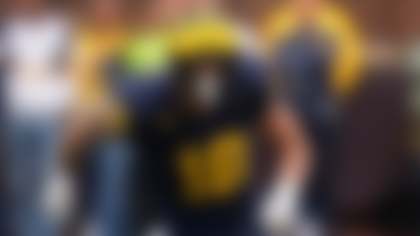FORT LAUDERDALE, Fla. -- During a season in which football fans witnessed a rise in the 3-4 defense's popularity, a funny thing happened en route to Super Bowl XLIV. Both teams participating in the big game sport 4-3 defenses.
The Indianapolis Colts and New Orleans Saints each hired new defensive coordinators last offseason, and each promised more aggressive packages and less vanilla coverages. Under Larry Coyer, the Colts used less Tampa 2 coverage, while Gregg Williams' Saints raised their blitz sack total from seven in 2008 to 18 in 2009.
Each defense had the opportunity to practice against a superior passing attack, so the Colts' and Saints' back seven (linebackers and secondary) better understand how to disguise coverages, tighten passing windows, re-route receivers and make plays on the ball. These defenses enter the Super Bowl with a combined 48 interceptions (42 in the regular season, six in the playoffs). Both quarterbacks will need to be very careful against them.
Here's a breakdown of the Super Bowl defenses:
Statistical production
Neither the Colts nor the Saints finished in the top half of the NFL rankings in total defense, which really challenges the age-old philosophy that defense wins championships. The Colts allowed 307 points during the season (19 per game), and the Saints gave up 341 points (21 per game). With their offensive scoring power, these teams could live with allowing some points in Sunday's game.
Both defenses allowed more than 120 rushing yards and 210 passing yards per game. The Colts gave up 388 yards to a New York Jets offense with a rookie quarterback in the AFC Championship Game. The Saints gave up 475 yards to the Minnesota Vikings in the NFC Championship Game. Super Bowl XLIV should feature plenty of offense, as these two defenses will hope to give up field goals rather than touchdowns.
Advantage:Colts.
Team speed
The Colts and Saints can really run to the ball. They have enough team speed to make up for a bad play and run down a receiver. After studying both units, there is little doubt that the Colts fly around the field like no other defense in the NFL. The Colts were smart to rest players on their undersized defense late in the regular season to make sure they were fresh for a playoff run.
Advantage:Colts.
Rushing defense
A power running game from offensive sets that include two tight ends and a fullback could be problematic for both defenses. Fortunately for those units, neither offense in this game thinks that way.
The Colts play run defense by getting an early lead and making opponents one-dimensional. The problem with that in Super Bowl XLIV is that the Saints can score even faster than the Colts and will have plenty of opportunities to run the ball against the league's 24th-ranked rushing defense. The Saints feature the league's sixth-ranked rushing offense, and just because the Colts neutralized the Jets' top-ranked rushing attack in the AFC Championship Game doesn't mean they will be able to shut down New Orleans. Unlike the Jets' Mark Sanchez, Drew Brees is an experienced field general. His passing proficiency will force the Colts to change their defensive calls, which should open up the inside running game.
The Saints aren't much better in run defense than the Colts, and they also rely on scoring early to get teams out of a running mode. Teams that stick with the run throughout a game can give the Saints fits (look at the Tampa Bay Buccaneers' Week 16 victory as evidence>). The Colts ran the ball just 34 percent of the time in the first half this season, and they must move that number to the 45 percent range to take advantage of the Saints' run defense.
Advantage:Saints.
Pass rush
The Colts and Saints each do a better job of pressuring quarterbacks than actually sacking them. That said, each team was led by a player with at least 13 sacks (the Colts' Dwight Freeney and the Saints' Will Smith).
In the playoffs, each defense has one sack, but they have administered a number of quarterback hits. The Saints put a number of questionable hits on Brett Favre in the NFC Championship Game, and it will be interesting to see what the officials call early in the Super Bowl if the Saints attempt to inflict the same sort of pain on Manning. Williams will call for heat on Manning, who has been sacked once in every 57 dropbacks. Williams also knows that Manning will have studied what Favre did against the blitz. Look for the inside pass rush from Anthony Hargrove and Sedrick Ellis to be a big factor in this game.
The Colts still mostly rely on a four-man pass rush. The problem is the uncertainty surrounding Freeney, who has a sprained ankle. If Freeney can't play, Coyer must manufacture pressure with players such as Clint Session.
Advantage:Saints.
Coverage units
The Saints must create interceptions so they aren't exposed by the Colts' great passing attack. An interception is a very real possibility -- Manning has thrown 17 in 18 games this season (16 in the regular season and one in the playoffs). Saints cornerbacks were consistently attacked by Favre in the NFC Championship Game, and expect Manning to do the same with Reggie Wayne, who will try to stay away from Darren Sharper. The Saints' Pro Bowl safety returned three of his nine interceptions for touchdowns this season.
The Saints also will have problems covering ColtsPro Bowl tight end Dallas Clark with linebackers and strong safety Roman Harper. If Williams overplays Wayne and Clark, then wide receivers Austin Collie and Pierre Garcon will have favorable matchups. Expect to see the Saints use more three-man pass rushes and leave eight in coverage more than usual.
The Colts will start a rookie cornerback -- either Jerraud Powers or Jacob Lacey -- and that means Brees will have a matchup that he likes on every play. Marques Colston will have his opportunities to go up against a rookie. Coyer's challenge will be to keep the Saints from successfully attacking his safeties with inside vertical routes on first down. If Brees sees any safety activity down in the box, he will go after him with the pass.
Advantage: Tie.
Turnovers
The Saints scored 147 points off turnovers during the regular season and another 21 during the playoffs. That equates to just over nine points per game generated by turnovers. The Colts scored 68 points off turnovers during the regular season but just three in the playoffs for an average of four points per game.
Advantage:Saints.
Pressure calls
Williams has pressure/blitz calls for every down and distance, and he will have well over a dozen calls for Super Bowl XLIV. He could save most of those calls for the second half. Williams doesn't want Manning studying pictures on the sideline or getting to the locker room at halftime to make necessary adjustments.
The Saints had more sacks from pressure calls than they did in straight four-man rush defenses. The Colts aren't nearly as aggressive as the Saints and only brought a fifth defender 13 percent of the time. The Saints will work on their pressure calls, but they also will need to be cognizant of the fact that Manning is a blitz killer.
Advantage: Tie.
Critical matchups
The Colts and Saints each have good pass rushers lining up over questionable left tackles. The matchups of Smith on Charlie Johnson and Freeney or Robert Mathis on Jermon Bushrod are tilted heavily in the favor of the rusher.
Advantage:Colts.
Adjustments
The first thing that these defenses must realize is that allowing 27 points might be a good day. The coaches have to prevent panic if the opposing team goes right down the field and scores on its first two possessions.
Both teams would be wise to consider a "rope-a-dope" philosophy and not worry about the quarterbacks running with the ball. A man-under two-deep scheme, which coach Bill Belichick implemented in the New England Patriots' upset victory over the "Greatest Show on Turf" St. Louis Rams in Super Bowl XXXVI, would be a good choice.
Keep those pass rushers fresh, because there will be around 40 pass plays per team in Super Bowl XLIV. Holding as much of the game plan until the second half as possible also will help against two brilliant quarterbacks. The Jets got to Manning for sacks on two of the first five plays of the game, but they never brought him down again.



